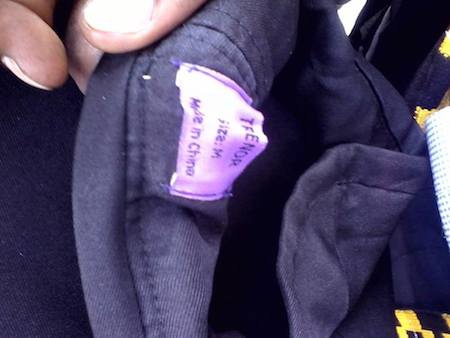Ghana’s insatiable quest for importing almost everything from China now knows no bound, such that academic gowns for the University of Ghana, Legon, are sourced from China.
The Finder can report on authority that the gowns used by undergraduate students of the university are China-made. The gowns are labelled “Trenor, made in China.”
Director of Public Affairs at the university of Ghana, Mrs Stella Amoah, who The Finder contacted on the issue, would initially not accept that the gowns were made in China until she was told the labels on the gowns indicated so.
“Who told you they were imported from China” was her initial question to the paper.
“Because the labels on them indicate so,” the reporter answered.
Mrs Amoah then proceeded to explain that initially the gowns were produced in Ghana but due to some challenges with collecting them back after renting them out to students, the university decided to “outsource them to a company to handle it.”
“Our gowns in the past, were done here; we have made them in Ghana; now we outsource it with a company, and Academic Affairs would have those details.
“We outsourced because people were not returning the gowns…so we have outsourced so that we can give it to a company to deal with it… that is what is being done now,” she explained further.
 Just when The Finder wanted the name of the company that has been contracted to provide the gowns for the nation’s premier university, the line went silent at Mrs Amoah’s end.
Just when The Finder wanted the name of the company that has been contracted to provide the gowns for the nation’s premier university, the line went silent at Mrs Amoah’s end.
Minutes later, another call was placed to Mrs Amoah, and this time she wanted to know the paper’s “beef” about the university sourcing its academic gowns from China.
“What you saw, had they written made in Ghana or made in China?” she asked.
“Made in China,” the paper responded
“So that means they came from china,” she said, now almost getting a little impatient.
When the paper sought further clarification on the company that the university outsourced the gowns from, Mrs Amoah would now not make any further comments on the company but rather went in circles on the subject.
“Outsourced, that means if you said you saw it with GIJ, we have given it to them; they have come to borrow it from us.”
When this paper reminded Mrs Amoah that she had earlier stated that the procurement of the gowns had been outsourced to a company, she explained that her use of outsourcing was in connection with the Ghana Institute of Journalism(GIJ) hiring the gowns recently for their graduation ceremony.
“I said somebody has come to outsource it from us, eh? Didn’t GIJ come to outsource from us?” she asked.
“Is that what you meant by outsourcing?” the paper asked.
 “Yes, these are University of Ghana gowns which they have come to borrow from us to use and they have used it and Daniel has found out that they are made in China so you want to confirm whether they are made in China or made in Ghana and I have told you that it is made in china…,” Mrs Amoah said.
“Yes, these are University of Ghana gowns which they have come to borrow from us to use and they have used it and Daniel has found out that they are made in China so you want to confirm whether they are made in China or made in Ghana and I have told you that it is made in china…,” Mrs Amoah said.
Not satisfied with this answer, the paper tried a third luck on the question on the outsourcing bit of the story, but that seem to have put a little stress on Mrs Amoah’s patience.
“Please, I tell you, forget about the outsourcing; anything we do in the University of Ghana, it goes through the usual processes. If these gowns were delivered to the University of Ghana, it means like all other things, if it is in large quantities, it means it will go through our usual procurement and tender processes. So these gowns would be in the same category,” she explained.
She however reiterated that the university “has processes for everything because we are a government institution.”
Ghana’s Parliament recently courted public anger and backlash when it emerged that the lawmakers imported furniture worth GH?60 million from China for their newly furnished chamber.
General News of Tuesday, 18 November 2014
Source: The Finder
Legon imports gowns from China













